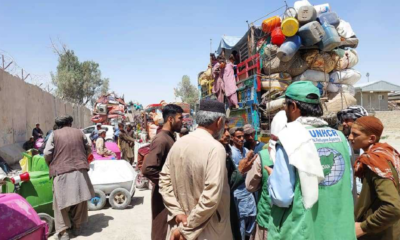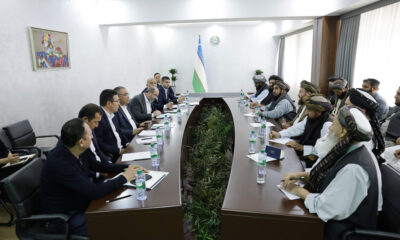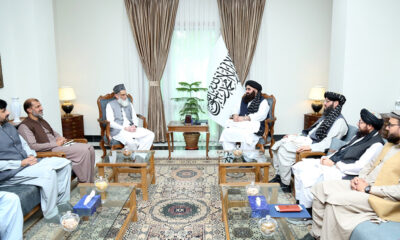Latest News
Troika calls on Taliban to cancel Spring offensive after Moscow summit
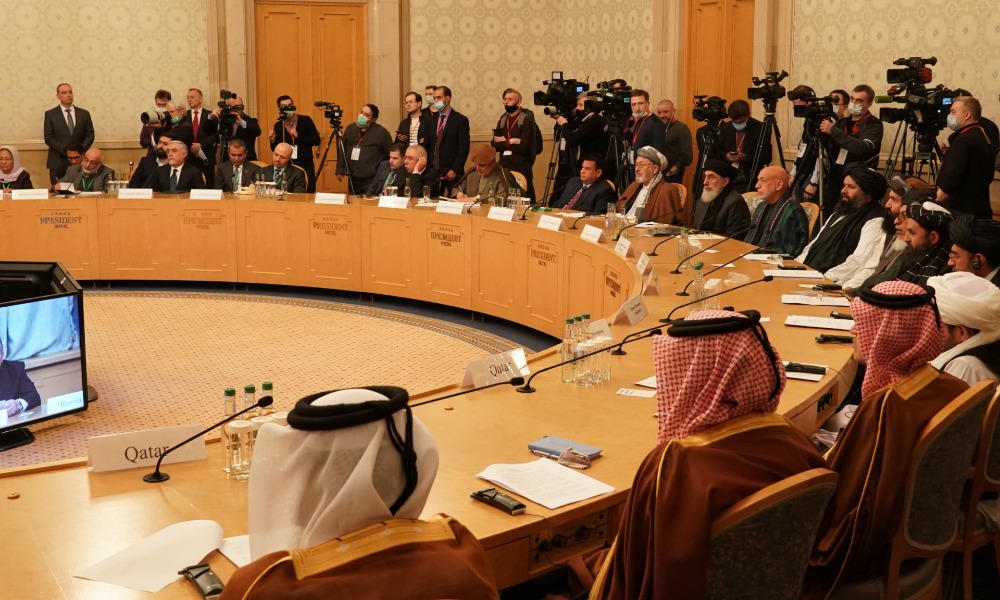
Russia, China, the US and Pakistan, also known as the Troika, on Thursday called on the Taliban to not pursue a Spring offensive and said they do not support the restoration of an Islamic Emirate.
Following a day of discussions in Moscow on accelerating the peace process in Afghanistan, the Troika stated they had agreed on a number of points.
In a joint statement issued by the four countries, they stated they acknowledge the widespread and sincere demand of the Afghan people for a lasting and just peace and an end to the war and “confirm that a sustainable peace can only be achieved through a negotiated political settlement.”
“We call on all parties to the conflict in Afghanistan to reduce the level of violence in the country and on the Taliban not to pursue a Spring offensive, so as to avoid further casualties and to create an environment conducive to reaching a negotiated political settlement.
Citing the UN Security Council resolution 2513 (2020), the Troika said they do not support the restoration of the Islamic Emirate and called on the Afghan government and the High Council for National Reconciliation to engage openly with their Taliban counterparts regarding a negotiated settlement.
“We urge participants in the intra-Afghan negotiations to engage immediately in discussions on fundamental issues to resolve the conflict, including the foundations of the future peaceful and stable Afghan State, the content of a political roadmap leading to an inclusive government, and the modalities of a permanent and comprehensive ceasefire.”
“At this pivotal moment, our four states call on the parties to negotiate and conclude a peace agreement that will bring an end to over four decades of war in Afghanistan,” the statement read.
They also said they strongly advocate a durable and just political resolution with will result in an independent, sovereign, unified and peaceful Afghanistan “free of terrorism and an illicit drug industry”.
They also called on both the Afghan government and the Taliban to ensure no terrorist groups nor individuals use Afghan soil to threaten the security of any other country.
The Troika also stated: “We reaffirm that any peace agreement must include protections for the rights of all Afghans, including women, men, children, victims of war and minorities.”
All concerned countries were also encouraged to support the Afghan people and to contribute to a lasting peace.
“We reaffirm our commitment to mobilize international political and economic support for a post political settlement in Afghanistan,” the statement read.
The Troika also acknowledged Qatar for its support of the peace process and said they were in support of the continuation of discussions between the negotiating teams in Doha.
In conclusion, they stated they welcome all international efforts that are underway to facilitate and support a negotiated settlement as soon as possible.
“We note that the UN Secretary General Gutteres’ appointment of Mr. Jean Arnault as his personal envoy on Afghanistan and regional issues. We welcome the UN playing a positive and constructive role in the Afghan peace and reconciliation process.”
Thursday’s event was attended by representatives of the Afghan government, the Taliban, prominent Afghan political figures and Qatar and Turkey representatives, who were guests of honor.
The US Special Representative for National Reconciliation Zalmay Khalilzad also attended the meeting, which is the first of two such summits planned.
The next landmark meeting will be held in Turkey next month – which is in line with Washington’s push for a political settlement as soon as possible.
Latest News
Return of Afghans from Pakistan could worsen already dire humanitarian situation: IFRC
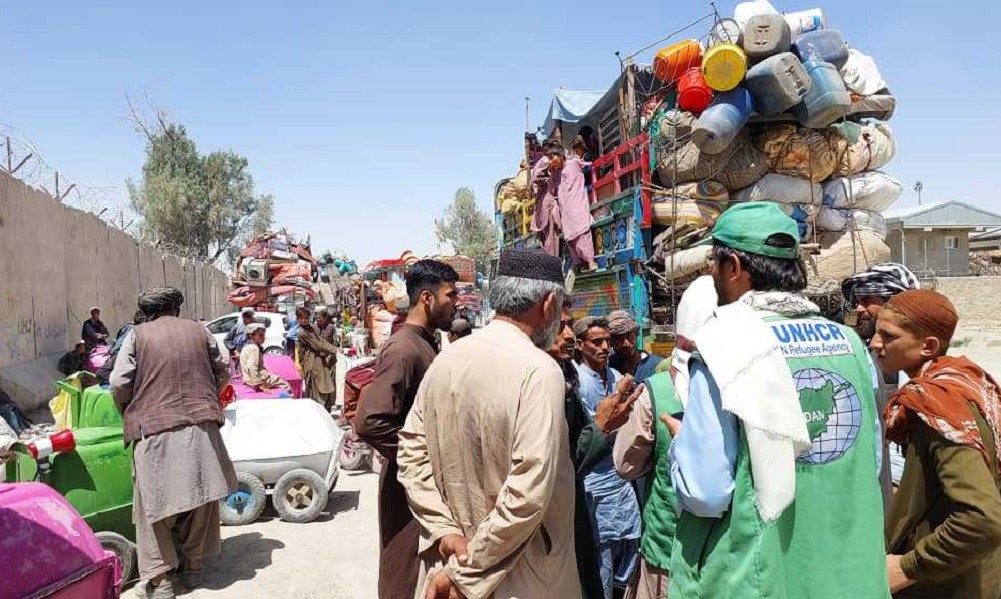
Return of Afghans from Pakistan could worsen already dire humanitarian situation in Afghanistan, the International Federation of Red Cross and Red Crescent Societies (IFRC) warned on Monday.
After decades of seeking refuge in Pakistan, up to a million Afghans could return to Afghanistan following a directive by the government of Pakistan which would require all Afghans without valid visas to leave the country by 31 March 2025.
IFRC said in a statement that the humanitarian needs of people returning to Afghanistan are high. Many have abandoned their livelihoods and personal belongings in Pakistan. Children, many of whom are already malnourished, need specialized care. Many families have been separated during the journey and need support to restore family links. Longer term support will also be needed to help people to re-establish their lives in Afghanistan.
Shahabuddin Delawar, the Acting President of the Afghan Red Crescent Society (ARCS), emphasized the urgent need for action.
“People returning are facing numerous challenges that they cannot navigate alone. Women and children represent a significant portion of those returning, and ensuring their safety and well-being must be our top priority. As a local organisation with a presence across the country, our aim is to provide immediate relief and long-term support to help people rebuild their lives safely and with dignity.”
Ahmed Suliman, the interim Head of Delegation for the International Federation of Red Cross and Red Crescent Societies (IFRC) in Afghanistan, expressed concern about the potential scale of the crisis.
“This dynamic situation will impact millions of people. Addressing immediate needs – such as food, healthcare, and shelter – is our top priority, while also planning to support people in the longer-term. The IFRC and National Societies are working alongside ARCS to tackle these challenges and provide tailored support people most in need,” he said.
IFRC said that currently, conditions in Afghanistan are not conducive for sustainable return and reintegration of large numbers of people, amid high levels of malnutrition and a struggling economy. There are also millions of internally displaced people in the country. Existing humanitarian support is insufficient to meet current needs and will only come under more pressure as higher numbers of people return.
It emphasized that all returns must be voluntary, safe and dignified. IFRC also called on the international community to provide adequate support to meet the growing humanitarian needs of people returning to Afghanistan.
Latest News
Afghanistan and Uzbekistan to expand cooperation in agriculture sector
Omari, led a high-level delegation from Afghanistan to Uzbekistan last week to engage in discussions with Uzbek authorities regarding regional collaboration and key agricultural matters.

Uzbekistan has expressed Tashkent’s willingness to cooperate with Afghanistan on various issues across the agriculture sector.
According to a statement issued by Afghanistan’s Ministry of Agriculture, Irrigation and Livestock, Uzbek Agriculture Minister Ibrokhim Abdurakhmonov met with his Afghan counterpart Attaullah Omari in Tashkent and pledged cooperation with Kabul.
Omari, led a high-level delegation from Afghanistan to Uzbekistan last week to engage in discussions with Uzbek authorities regarding regional collaboration and key agricultural matters.
The objective of the visit was to address the challenges, posed by climate change, on the water reserves of the Amu Darya River basin; and fostering enhanced cooperation between the two nations in agriculture, irrigation, livestock management, food security, capacity building, and related spheres.
At the meeting, Omari underlined the importance of expanding agricultural cooperation and highlighted investment opportunities in this sector and other related areas.
He reaffirmed the Islamic Emirate’s commitment to providing all necessary facilities for foreign investors, including those from Uzbekistan.
Omari also called for the exchange of agricultural technology and expertise between the two countries, saying Afghanistan urgently needed to boost its agricultural production given current circumstances.
“We must work together to enhance agricultural output not only to meet domestic needs but also to contribute to reducing global poverty,” the minister commented.
For his part, Abdurakhmonov reiterated Tashkent’s commitment to greater collaboration with Kabul at various agricultural initiatives.
He noted Uzbekistan had a significant demand for agricultural products and said Afghanistan could play a vital role by supplying cotton, rice, fruits and vegetables.
He assured Uzbekistan was ready to provide Afghan farmers with improved seeds and purchase their products after harvest.
Latest News
IEA informs Pakistan envoy of it’s ‘regret’ over forced deportations of Afghan refugees
Muttaqi voiced his disapproval during a meeting with Pakistan’s Chargé d’affaires to Afghanistan, Obaidur Rehman Nizamani.
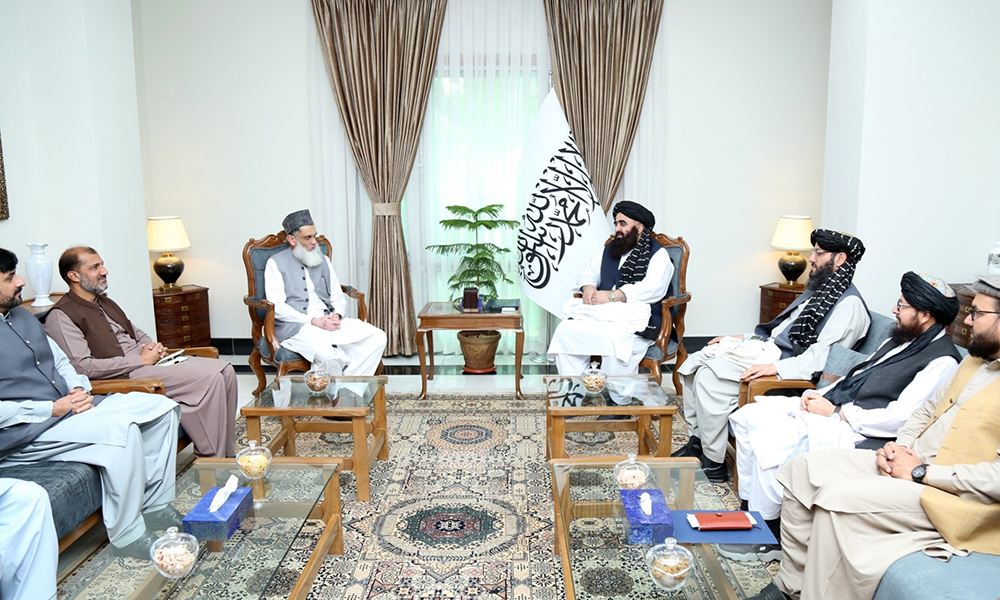
Afghanistan’s Minister of Foreign Affairs, Amir Khan Muttaqi, on Monday expressed regret over forced deportations of Afghan refugees from Pakistan, and of the “inappropriate” treatment being dealt to them.
Muttaqi voiced his disapproval during a meeting with Pakistan’s Chargé d’affaires to Afghanistan, Obaidur Rehman Nizamani.
According to a statement issued by Afghanistan’s Foreign Minister the “Chargé d’affaires of the Pakistani Embassy said that it understands the concerns of the Islamic Emirate and will share the issue with the relevant organizations.”
Pakistan has meanwhile ramped up its deportation of Afghan refugees
In a report released on Sunday, April 13, the International Federation of Red Cross and Red Crescent Societies (IFRC) warned that the “scale and scope of the ongoing returnee crisis is both staggering and rapidly escalating.”
The report noted that projections from the International Organization for Migration (IOM) estimate that from April 1, approximately 20,000 people will cross into Afghanistan from Pakistan – through Torkham (13,000) and Spin Boldak (7,000) border crossings.
“This anticipated daily surge calls for an urgent, well-resourced, and long-term strategy to meet the needs of returnees and reinforce overstretched humanitarian systems,” IFRC said.
Early last month, the Pakistan government issued a directive mandating that all Afghan Citizen Card (ACC) holders must leave the country by March 31. This directive has since led to intensified enforcement measures, with many returning refugees reporting that police have been mistreating the refugees and confiscating possessions and property.
There are an estimated 2.8 million Afghans in Pakistan, of whom approximately 1.4 million are either unregistered or undocumented. The Pakistani authorities’ actions pose a significant risk to an already fragile community recovering from decades of conflict, recurring disasters, and economic challenges.
The IFRC meanwhile stated that recent reports indicate that the Pakistan government has commenced demolishing unauthorized settlements occupied by undocumented foreigners, further heightening fears among Afghan migrants.
“The repercussions of these actions have sparked a notable surge in returnees,” the IFRC report stated.
The registration process for returnees, managed by authorities with support from IOM, has meanwhile become overwhelmed due to the staggering number of individuals arriving at border crossings. This has resulted in delays and prolonged stays in transit centers, complicating the reintegration process for returnees, the organization stated.
“As the situation unfolds, the health, safety, and well-being of these returnees—especially vulnerable groups such as women, children, the elderly, and individuals with disabilities—are of paramount concern. The existing pressures on limited humanitarian services and resources are exacerbated by the fact that many humanitarian organizations have scaled down or ceased operations due to funding constraints, particularly following reductions in support from major donors.
“Given these pressing humanitarian needs, there is an urgent requirement for comprehensive support, including access to medical care, adequate shelter, and essential supplies.
“This is critical to address the dire conditions faced by the returnees and to mitigate the humanitarian impact of this large-scale population movement. Coordinated efforts are essential to ensure the safety and well-being of all individuals involved, particularly considering the evolving dynamics of this humanitarian crisis.,” the organization stated.
-

 Regional5 days ago
Regional5 days agoAre B-2 bombers a message to Iran? ‘We’ll let them decide,’ Pentagon chief says
-
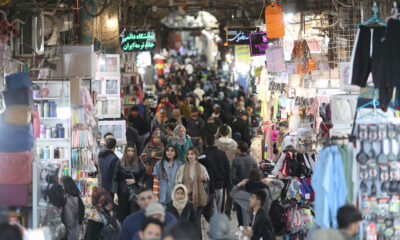
 Regional5 days ago
Regional5 days agoAnxious Iranians hope nuclear talks may ease risk of US attack
-

 Latest News5 days ago
Latest News5 days agoUS House panel approves bill to prevent aid falling into IEA’s hands
-
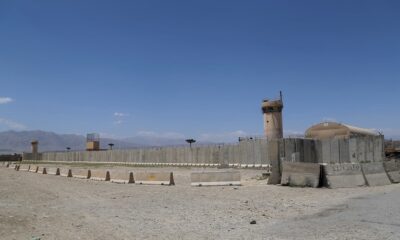
 Latest News3 days ago
Latest News3 days agoNo American military presence in Bagram: US defense official
-

 Sport4 days ago
Sport4 days agoAfghanistan A registers massive win over Ireland A in 4-day match
-
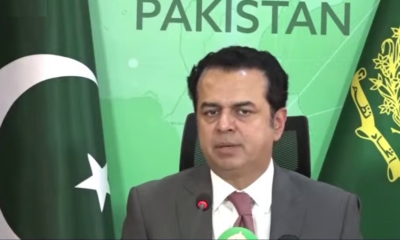
 Latest News3 days ago
Latest News3 days agoNo new deadline will be given for Afghan refugees: Pakistani official
-
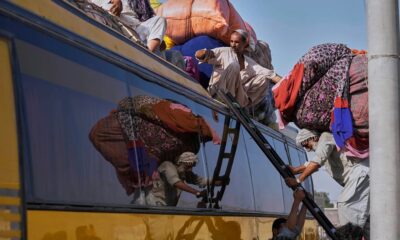
 Latest News4 days ago
Latest News4 days agoPakistan warns it may expel thousands of Afghans hoping for resettlement in the West
-

 World5 days ago
World5 days agoTrump U-turns on tariffs but keeps trade war heat on China




